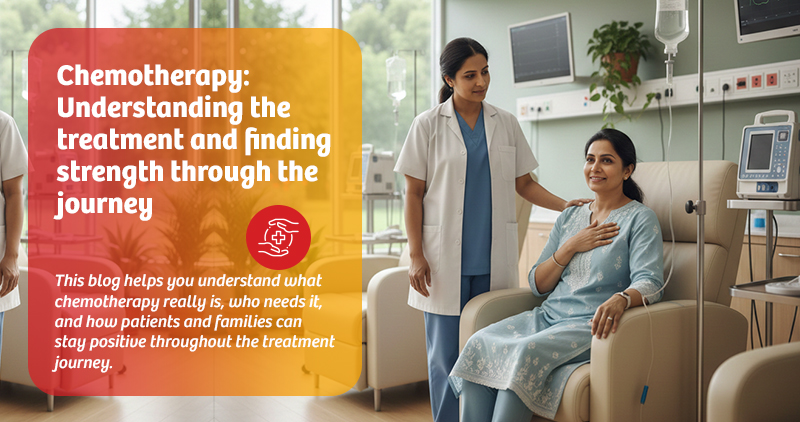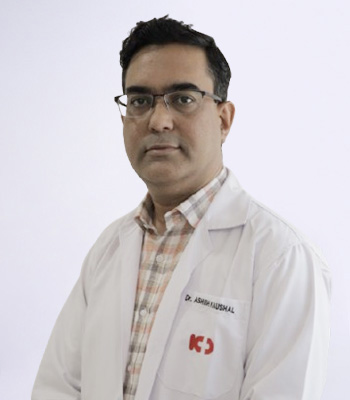

By Dr Ashish Kaushal
Senior Consultant Medical Oncology
Nov 19, 2025
When you hear the word chemotherapy, it often brings a wave of fear, uncertainty, and countless questions. However, chemotherapy — commonly known as chemo — is one of the most effective and scientifically proven treatments for many types of cancer. With modern advances in medicine, chemotherapy today is far more targeted, manageable, and hopeful than ever before.
This blog helps you understand what chemotherapy really is, who needs it, and how patients and families can stay positive throughout the treatment journey.
Chemotherapy is a drug-based treatment used to destroy or slow down the growth of cancer cells. Cancer cells divide rapidly and uncontrollably, forming tumours or spreading through the bloodstream. Chemotherapy targets rapidly dividing cells to control or eliminate cancer.
Unlike surgery or radiation therapy, which target specific areas of the body, chemotherapy is a systemic treatment — it travels throughout the body to destroy cancer cells wherever they may be. It enables it to target cancer cells that may have spread beyond the original tumour site.
Chemotherapy drugs disrupt the ability of cancer cells to grow and divide. Depending on the type of cancer and the drug combination used, chemotherapy may
Chemotherapy can be given in various ways — through an intravenous (IV) line, oral tablets, injections, or topical creams — depending on the cancer type and stage.
Chemotherapy is suggested for various reasons, depending on the diagnosis, stage, and the patient's overall health. It may be used alone or in combination with other treatments.
1. As primary treatment
For certain cancers, such as blood cancers (leukaemia, lymphoma, and myeloma), chemotherapy serves as the primary line of treatment to destroy cancer cells throughout the body.
2. Before surgery or radiation (Neoadjuvant therapy)
Sometimes, doctors use chemotherapy to shrink a tumour before surgery or radiation. It helps make the procedure easier and more effective.
3. After surgery or radiation (Adjuvant therapy)
Even after removing a visible tumour, microscopic cancer cells may remain. Chemotherapy helps eliminate those, reducing the risk of recurrence.
4. For advanced or metastatic cancer
When cancer has spread to other parts of the body, chemotherapy helps control its growth, relieve symptoms, and improve quality of life.
5. For palliative care
In certain cases, chemotherapy is used not to cure, but to ease symptoms like pain or pressure caused by cancer growth. It helps patients live more comfortably.
While chemotherapy is highly effective against cancer cells, it can also affect healthy cells that divide rapidly — such as those in the mouth, intestines, skin, and hair. It can lead to side effects such as
However, today's oncology care is much more advanced and patient-friendly. Doctors use supportive medications, nutrition plans, and modern protocols to minimise discomfort.
Each patient's body responds differently to treatment, and most side effects are temporary. In many cases, they gradually subside once the treatment is completed.
Chemotherapy can be physically and emotionally challenging. Yet, many people not only recover but also rediscover strength, gratitude, and resilience. Here are some ways to maintain positivity and mental wellness:
1. Focus on the goal — healing
Remember, chemotherapy is a path toward recovery. Every session brings you closer to controlling or curing the disease. Keeping this in mind helps you face temporary challenges with courage.
2. Trust your care team
Your oncologists, nurses, and caregivers are your partners in this journey. Never hesitate to share what you feel — whether it's side effects, emotional stress, or doubts. They can guide you with personalised solutions.
3. Surround yourself with support
Lean on your family, friends, and support groups. Talking to other survivors can inspire hope and help you realise you're not alone. Emotional strength often comes from shared experiences.
4. Take care of your mind and body
Activities such as meditation, listening to music, reading, gentle exercise, and deep breathing can help reduce stress and improve sleep. Eat nutritious foods and stay hydrated.
5. Celebrate small victories
Every completed chemo cycle, every test result, and every better day deserve celebration. These moments of progress fuel motivation for the next step.
6. Maintain a positive outlook
Positivity doesn't mean ignoring challenges; it means choosing to believe that healing is possible. Many survivors think that maintaining a positive mindset played a significant role in their recovery.
Chemotherapy today is significantly more advanced than it was a decade ago. Medical science has made remarkable progress in developing treatments that are more targeted, safer, and more effective.
Targeted therapy: Focuses on specific cancer cell markers, sparing healthy cells.
Immunotherapy: Uses the body's immune system to fight cancer more naturally.
Personalised chemotherapy plans: Based on genetic and molecular profiling, ensuring better outcomes.
Day-care chemotherapy units: Allow patients to receive treatment in a few hours and return home the same day.
Such advances ensure that patients can continue much of their routine life, with less disruption and greater comfort.
Chemotherapy is not just a medical treatment — it's a journey of courage, patience, and faith. Every drop of medicine represents science, hope, and countless success stories. Thousands of cancer survivors around the world stand as living proof that chemotherapy saves lives.
While the road may seem difficult, remember that you are not walking it alone. With the proper medical care, emotional support, and a positive spirit, recovery is absolutely possible.
If you or a loved one has been advised chemotherapy, don't lose heart. Seek clarity from your doctor, understand the treatment plan, and take one step at a time. Each phase of chemotherapy — though challenging — is a milestone toward healing.
Science has made cancer treatment more effective and more compassionate than ever before.
With the right medical expertise and inner strength, you can not only fight cancer — you can emerge stronger than ever.
At KD Hospital’s leading Comprehensive Cancer Care Centre, we offer Medical Oncology, Surgical Oncology, and Radiation Therapy — all under one roof, ensuring seamless, advanced, and compassionate care at every step of your journey.